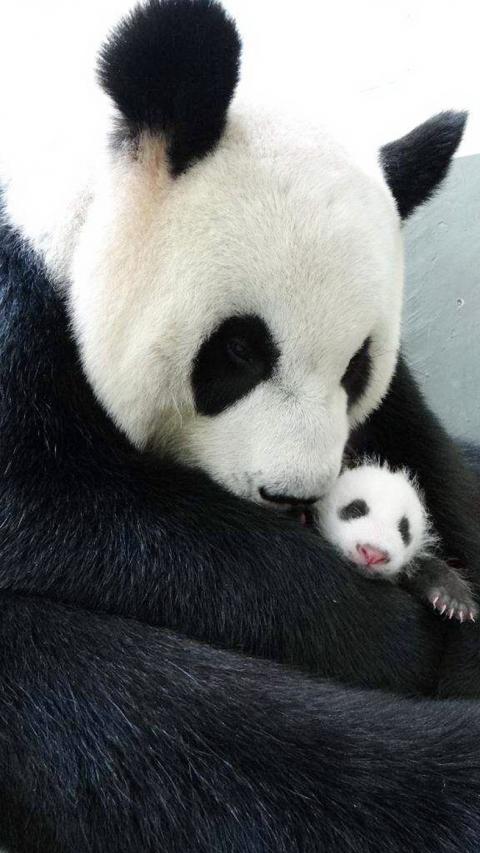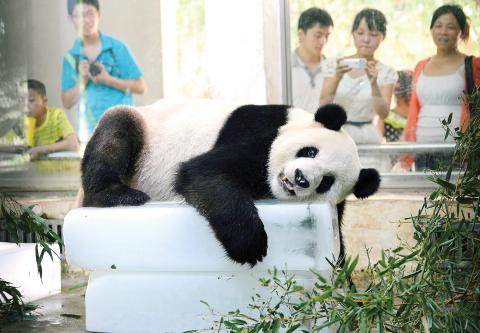When Edinburgh Zoo’s giant panda, Tian Tian, was thought to be expecting a cub, Michael Livingstone’s job took over his whole life. A keeper for carnivores and giant pandas at the zoo, he was part of a core group of five who closely monitored the pandas’ behavior. “We were watching them for seven weeks, 24 hours a day. It was a lot of work. When you get to the breeding season, and then watching for her to potentially give birth, everything else goes on hold,” says Livingstone. “That is all you can think about — you don’t really have a life apart from pandas. Even outside work, with family friends, people are always asking how they are getting on.”
Livingstone, 25, got a summer job at the zoo in his home city while he was studying animal biology at Edinburgh University. After the summer, he got a weekend job. “I was very lucky,” he says. “The job was only meant to be three months, then I was lucky enough to get the weekend job. I was on part-time hours until the pandas arrived and then I was made full-time — not necessarily to work with the pandas, although that is what happened.”
The pandas have remained one of his main responsibilities, but there are plenty of other animals on Livingstone’s list. “I work a lot with the giant pandas just now, but I also look after bears, lions, tigers, jaguars, leopards, smaller things like skunks, otters, meerkats, anteaters ... We don’t work with all the animals every day. It’s done on a rota[ting] basis,” he says. “Normally, you get a week or two with a group, so you might be with the big cats, which includes leopards, jaguars, tigers and that run of animals where they are in the zoo. You’re responsible for them.”

Photo: Taipei Times
Livingstone’s day starts with picking up his keys and radio, and then it’s off to see the animals.
“You go and check your animals, and feed them if they get fed in the morning, then make sure everything’s healthy, well and fine, and acting as normal. From that, you start your cleaning and that’s the big part of the morning. Up until about midday, the main part is cleaning. After that, in the afternoon you are checking the animals, locking up the houses and feeding them again in the afternoon.”
Keepers are also responsible for working on “enrichment” with the animals.

Photo: AFP
“We try to do that with a lot of the animals, especially in the carnivore section. It’s important to keep them active and it encourages their natural behavior. [If they follow scent markings] we give them paper sacks with bedding from other animals to put scents around the enclosure, or food around their enclosure if they are animals that forage a lot for their food. They have to look for it rather than getting it in a dish. We try to get them to do things that they would have to naturally do, so you’re not just giving them everything on a plate. It’s positive for them and promotes their health and mental stimulation.”
On-the-job training in the carnivore section starts with small tasks, says Livingstone.
“You start off with things that are less dangerous — so that would be the hunting dogs, porcupines — which are not carnivores but we have them in this section — skunks, and so on. You work your way up, you get trained on one section, then, after a period of time you move on to another section.”
In some parts of the zoo, training schedules are fixed, but with the carnivores, Livingstone says, training is done on an individual basis. Once the senior or head keeper thinks the trainee keeper is ready, they can move on to the next group of animals. “It’s a safety thing, and if you’ve never worked with animals before, it’s a steep learning curve. You pick things up working with small animals that relate to the bigger animals, and the more dangerous animals. You are getting the basics and understanding.”
Trainee keepers also have to take a diploma in the management of zoo and aquarium animals, after which they become fully qualified keepers. The career ladder then leads naturally from keeper to senior or head keeper, although not everyone wants to climb those rungs. “A lot are happy to be a keeper and work with their animals. And there are a lot of different options. Sometimes other zoos have conservation work out in the field, so there might be opportunities to go out and work with a species in the wild for a period of time before you come back and further your zoo career. It can be quite diverse.”
Getting that first break is the toughest, though. It’s a competitive field, says Livingstone. “There are a lot of people who want to work in a zoo or closely with animals, but there are not a lot of positions available, and not much turnover.”
It’s a demanding job that won’t suit everyone.It’s also not a nine-to-five job.
“I have done a lot of extra hours, not necessarily paid, because it’s just what you do. A lot of things happen outside the working hours, and you are there when you are needed — last year I worked on Christmas Day,” Livingstone says.
“But people are generally happy to do the extra work. They are your animals and you are looking after them, you build up a bond and you want the best for them.”

In the March 9 edition of the Taipei Times a piece by Ninon Godefroy ran with the headine “The quiet, gentle rhythm of Taiwan.” It started with the line “Taiwan is a small, humble place. There is no Eiffel Tower, no pyramids — no singular attraction that draws the world’s attention.” I laughed out loud at that. This was out of no disrespect for the author or the piece, which made some interesting analogies and good points about how both Din Tai Fung’s and Taiwan Semiconductor Manufacturing Co’s (TSMC, 台積電) meticulous attention to detail and quality are not quite up to

April 21 to April 27 Hsieh Er’s (謝娥) political fortunes were rising fast after she got out of jail and joined the Chinese Nationalist Party (KMT) in December 1945. Not only did she hold key positions in various committees, she was elected the only woman on the Taipei City Council and headed to Nanjing in 1946 as the sole Taiwanese female representative to the National Constituent Assembly. With the support of first lady Soong May-ling (宋美齡), she started the Taipei Women’s Association and Taiwan Provincial Women’s Association, where she

Chinese Nationalist Party (KMT) Chairman Eric Chu (朱立倫) hatched a bold plan to charge forward and seize the initiative when he held a protest in front of the Taipei City Prosecutors’ Office. Though risky, because illegal, its success would help tackle at least six problems facing both himself and the KMT. What he did not see coming was Taipei Mayor Chiang Wan-an (將萬安) tripping him up out of the gate. In spite of Chu being the most consequential and successful KMT chairman since the early 2010s — arguably saving the party from financial ruin and restoring its electoral viability —

It is one of the more remarkable facts of Taiwan history that it was never occupied or claimed by any of the numerous kingdoms of southern China — Han or otherwise — that lay just across the water from it. None of their brilliant ministers ever discovered that Taiwan was a “core interest” of the state whose annexation was “inevitable.” As Paul Kua notes in an excellent monograph laying out how the Portuguese gave Taiwan the name “Formosa,” the first Europeans to express an interest in occupying Taiwan were the Spanish. Tonio Andrade in his seminal work, How Taiwan Became Chinese,